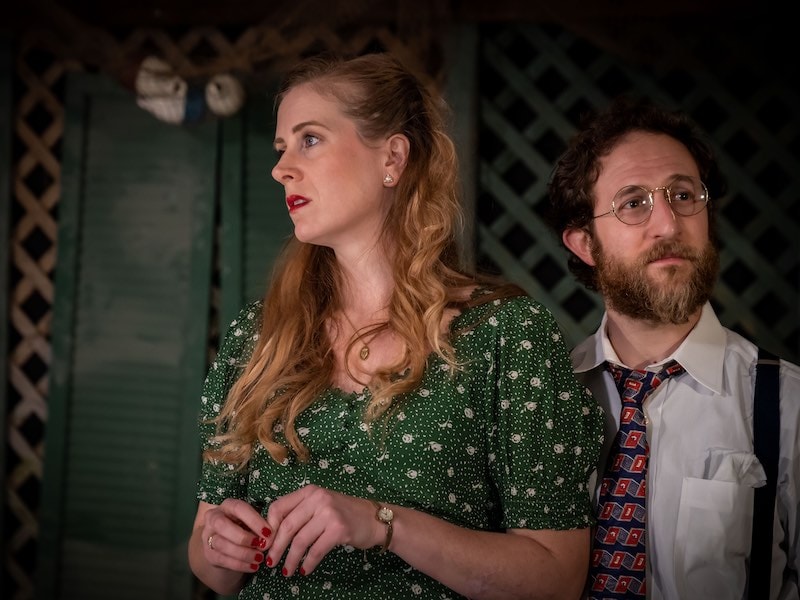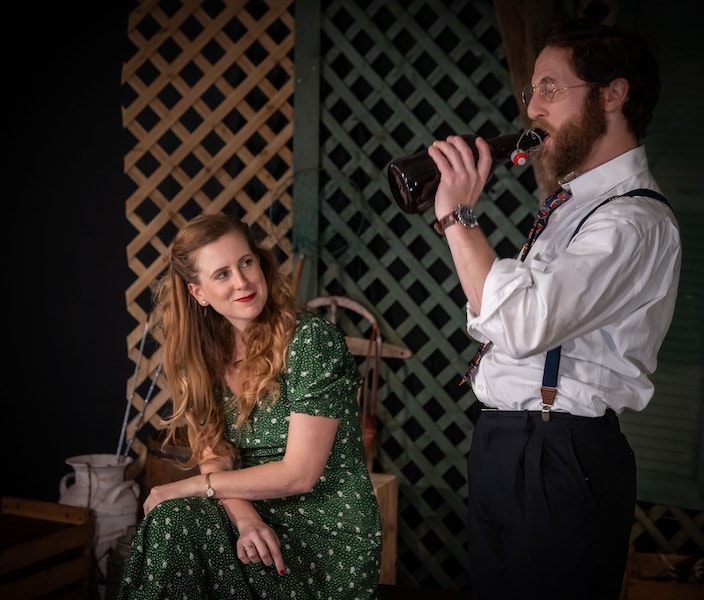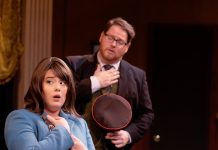Possibly with tongue at least partway in cheek, Lanford Wilson once described his Pulitzer Prize–winning 1980 play, Talley’s Folly, as a “simple romance.” In Nova Nightsky’s Theater’s production, it’s not so simple, being enriched by its complications and nuances.
A fluently written two-character jewel box of a play, Talley’s Folly is essentially about intimacy: it’s scary, people erect defenses against it, and lowering barriers to truly know another person is risky. That theme plays well in Nova Nightsky’s small, very intimate studio performance space, where every facial, physical, and vocal detail of the actors’ performances is up close and personal to the audience.
The style of acting called for in such a setting has something in common with film; small changes in a look, body positioning, or tone of voice can carry major implications. Adam Ressa, as Matt Friedman, and Jaclyn Robertson, as Sally Talley, play the subtleties beautifully, giving the audience a very full sense of who these characters are, and why. It would be possible for actors to deliver Wilson’s lines in a way that would make either or both of the characters annoying. Robertson and Ressa avoid this pitfall. For all their quirks, Matt and Sally are endearing, and the audience cannot resist them any more than they can ultimately resist one another.

The backstory: The previous summer, Matt, a 42-year-old, politically left-leaning, Jewish accountant, had spent a week in Lebanon, Missouri, Sally’s (and Lanford Wilson’s) hometown. They went out with each other every night he was there. He was smitten. After going back to St. Louis, Matt wrote to Sally nearly every day. Sally, 31 and treated by her prosperous, conservative, anti-Semitic family as a spinster, did not reply. Matt tried to visit her at the Army hospital where she worked; she hid in the kitchen. Finally, on July 4, 1944, he visits her home in Lebanon, where her relatives emphatically made him unwelcome. He repaired to the “folly” of the play’s title, a somewhat decrepit 1870 boathouse near the Niangua River, hoping to persuade her that they should be together.
Ressa’s Friedman is all nervous energy and verbal cleverness, with at times a Groucho Marx–like cadence and head tilt that feel less an imitation than something that is part of his being. Matt is very good at numbers and, by his own admission, not very good with people. His rapid-fire speech, constant wit, and insistent probing of Sally’s actions and motives are his emotional Maginot Line, a fine example of a wall built to keep out pain that pens its builder in.
For her part, Sally, in her refusal to explicitly acknowledge her feelings for Matt, or to say much at all about the reasons for her pushing him away, has built walls of her own. But, in one of the nicest aspects of Robertson’s characterization, Sally’s words are at frequent odds with her physicality, which is clearly comfortable around Matt, as though her body knows what her mind will not admit. What Sally feels for Matt is apparent to the audience, even if not to her.
Even when Matt, in response to Sally’s questioning, finally tells her his family story, he does so in a distanced, fable-like, third-person way. His speech slows down, becomes more reflective, quieter, and more plain than clever. His willingness to share his deepest sorrows, and their effects on who he is now, allows Sally ultimately to tell him of the roots of her sadness and fear of getting close to him.
Robertson and Ressa have worked closely with director Ward Kay in the past, as this relatively new company has come together. The quality of their collaboration is evident in their very smooth, seamless rendering of the play. Nothing is forced or “stagey.” The plentiful humor in Wilson’s script is fully explored. What we see is the very real interaction of two characters we cannot help caring about. When the characters finally agree that life together will be very interesting, their connection is fully earned.

Ressa also designed the set, a tumbledown combination of wood planking, latticework, shutters, and miscellaneous objects that might be found in a disused boathouse. The set also conceals one “special effect” used delightfully as Matt totters on a pair of ice skates he finds in a crate. The confined space available for the set works to the production’s advantage. While the characters circle around each other — instead of the waltz that Matt envisions at the beginning of the play — they are never physically distant from one another. When they dance together for the first time at the play’s conclusion, it is an organic outgrowth of the way they have moved around the stage throughout.
There is a kind of desperation in the loneliness of Matt and Sally that can give way to intimacy only when each is willing to be vulnerable to the other. This may be a cliché of couples counseling, but seeing it manifest in thoroughly believable characters, in Nova Nightsky’s quite exquisite production, is both powerful and sweet. Something there is that doesn’t love a wall, that wants it down.
Running Time: One hour 37 minutes, with no intermission.
Talley’s Folly plays through April 23, 2023, at the Nova Nightsky Theater Studio, 1057 W. Broad St., Falls Church, VA. Thursday-Saturday performances begin at 8 p.m., with Sunday matinees at 2 p.m. Tickets are $25. Tickets and information about the show are available at novanightskytheater.com. Attendees should be aware that parking is not allowed in the front lot facing Route 7; parking is available in the lot behind the shopping center.
COVID Safety: Masks are recommended but not required.




